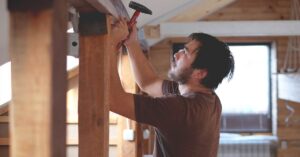When the commercial real estate market is strong and bank lending parameters are relaxed, mortgage brokers tend to focus on the standard property types they know can be financed via multiple sources. This is understandable. Why take chances with transactions that can prove difficult when you have a full pipeline of loans that traditional lenders are clamoring for?
In down cycles, however, you have to broaden your horizons and take on niche assets you may have shied away from in the past, such as churches or synagogues, gas stations, auto repair businesses and even aircraft financing. These deals can be highly profitable and help to establish your business in market segments that your competitors may avoid.
Many commercial mortgage brokers fear the unknown, but getting started in a niche may simply involve extra study. First, you will need to find lenders that will finance a church or gas station. You then need to learn what lenders will focus on in terms of loan approval. But understanding how to qualify a church, gas station or even an aircraft is not as intimidating as it may sound.
What can prove most difficult is the on-again, off-again appetite that lenders may have for these types of properties. Surprisingly, many banks will finance a church loan, although the appetite may vary by location. If you finance loans nationwide, for example, the Bible Belt may have more opportunities due to a higher concentration of religious institutions.
If you have no experience in originating these types of deals, you will need to understand the lender’s submission requirements and qualifications. When analyzing a church, lenders will factor in the unique ways that religious institutions raise funds. Churches generate revenue through tithes and offerings. Some also raise money via donations for a specific use, such as a building fund.
Church financing
Lenders look at the church’s audited financial statements to determine how much loan it can qualify for. This calculation is normally in the range of three to three-and-a-half times the institution’s annual revenue. So, if a church records annual revenue of $500,000, it can qualify for a loan of $1.5 million to $1.75 million to buy or refinance real estate.
Churches are nonprofit entities and thus do not file traditional tax returns. In general, individual church members won’t agree to personally guarantee the loan. These factors make the loan a riskier proposition for lenders. The lender must assume future revenue based on past revenue. This can prove tricky, especially given the COVID-19 pandemic and the inability for members to gather, which has hurt the revenue streams of many religious institutions.
Religious entities also tend to add new facilities or make improvements as they grow. Lenders typically will finance projects if improvements can generate additional revenue, such as by adding a daycare center. Some nonbank lenders specialize in lending to houses of worship. So, prior to making a proposal, you should research which lenders have experience and then learn their approval criteria.
Gas station loans
Much the same as churches, gas stations are a special type of asset that can be challenging to finance. Many banks and credit unions will lend on gas stations, but they tend to look closely at the brand, the location, supply agreements and the types of tanks they have in place. Gas stations will always present potential environmental issues, so understanding the local environmental regulations and performing due diligence will be beneficial in guiding clients through the financing process.
Gas stations can sometimes include a convenience store or a restaurant chain. These spaces may be operated by a tenant, so understanding the revenue distribution between the parties is critical. These deals can be arduous and time-consuming. Gas station deals are not for the faint of heart or those with a short attention span. They can take the better part of 12 months due to environmental issues, appraisals and complicated ownership structures.
Take, for example, the recent case of a portfolio of 10 gas stations, which eventually secured a loan for $14 million. To make this deal happen, the mortgage broker had to work with multiple lenders because banks and credit unions typically limit themselves to $5 million in exposure. Getting all lenders on the same page was a challenge. Despite its hurdles, however, this deal was eventually successful. It also was lucrative for the broker and will likely lead to other opportunities. Taking on a new niche expands your knowledge and repertoire.
Broadening your focus to include underserved property types, such as houses of worship, gas stations or aircraft, is a great way to set yourself apart from the competition.
Beyond real estate
Brokers also can launch into lending niches outside of real estate, which can prove lucrative while indirectly supporting their real estate financing business. One natural area of specialty lending, for example, is financing for aircraft or boats.
Many banks will lend on aircraft and these deals tend to be large. Determining which lender to use normally depends on the age of the aircraft, its intended use and whether the client has a banking relationship with the lender. Take, for example, a recent deal involving two aircraft loans for the same client. The borrower had done previous real estate financing deals, resulting in sizable and profitable transactions for the broker.
To take on a deal like this, however, the broker needed to research lender guidelines and the borrower profile had to ensure a smooth transaction. Lenders evaluate aircraft differently than commercial real estate. The key factors have more to do with the age of the aircraft and whether it will be used for personal use or for business charters. Another critical component is whether the aircraft has an engine maintenance plan. Aircraft that do not have a plan generally will have limited, if any, financing options.
As with real estate, you still need to compile the requisite financial information and liquidity verification, but you also need to provide ownership experience, projected flight hours, engine maintenance plans and management company information. Personal-use aircraft normally require lower downpayments as little as 15% and can be offered with longer amortization periods of up to 20 years.
Typically, the higher the downpayment, the longer the term available. Aircraft purchased for charter use will require larger downpayments of 20% to 30%. Older aircraft will command shorter amortization periods of seven, 10 or 15 years. All types of aircraft loans normally have fixed-rate terms with a balloon payment due at the end.
Unlike commercial mortgages, there is no reset option for aircraft loans and they often have a prepayment penalty period. The monthly payment works just like a mortgage, however, with the bulk of the payment going toward interest rather than principal during the first few years. For example, if a client makes the minimum monthly payment on a 20-year loan, they’ll gain about 2% equity in the plane in the first year. As time goes on, the principal increases and the interest decreases.
The bottom line is that aircraft financing is a good side niche. Not only can it be lucrative for the broker, it keeps you in contact with an affluent client base that could lead to more commercial mortgage business.
● ● ●
Broadening your focus to include underserved property types, such as houses of worship, gas stations or aircraft, is a great way to set yourself apart from the competition. Diversification is crucial for continued success so you do not become too dependent on one or two segments of the market. If these segments experience a downturn, it can greatly affect your income. This philosophy will prove fruitful and lead to more opportunities to generate revenue that previously were overlooked. ●
Author
-

Rob Diodato is the president of York Commercial Finance, a commercial mortgage advisory company with offices in Dallas and New York. Diodato arranges financing for commercial real estate transactions nationwide for all property types. Diodato has more than 26 years of experience in the commercial and residential mortgage industries.
View all posts







